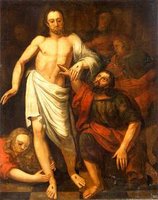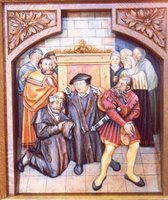Confession and Forgiveness by God through Man
Q: I’m 62 years old and am church shopping. Baptists tell me that I should confess my sins directly to God. Catholics tell me that I must confess to a priest. Who is correct? Reading John 20:23 seems to indicate that the latter have a better argument. How about the Lutherans, what do they believe? Does Matthew 9:1-8 give man the authority to forgive sins?
 A: Overall, I’d agree with your assessment of John 20. Notice how the preceding verses lead up to this understanding. Jesus suddenly appeared among the disciples late on that resurrection day. He calmed their fears by granting His peace, then showing “them his hands and his side. (vv. 19-20)”
A: Overall, I’d agree with your assessment of John 20. Notice how the preceding verses lead up to this understanding. Jesus suddenly appeared among the disciples late on that resurrection day. He calmed their fears by granting His peace, then showing “them his hands and his side. (vv. 19-20)”After again granting His peace, the Lord continued, “As the Father has sent me, even so I am sending you. (v. 21)” Thus, whatever commission these men received from Christ was based upon the commission Christ received from His Father. And since nothing was more central to the work of Jesus on earth than reconciling sinful man with our sinless God through the forgiveness of sins, it shouldn’t surprise us to hear Jesus’ following words: “Receive the Holy Spirit. If you forgive the sins of anyone, they are forgiven; if you withhold forgiveness from anyone, it is withheld. (vv. 22-23)”
The account you cite from Matthew 9 doesn’t really impart divine authority to man. While the Scribes looked upon Jesus as only a man, we know that He was also fully God. Thus, He has the authority to forgive both as part of His intrinsic, eternal nature and according to the will of His Father. In other words, He could forgive because He was God.
However, there is an account in Matthew, paralleled elsewhere in the Gospels, where Jesus does specifically authorize men to carry out this ministry of forgiving sins. Following Peter’s great confession that He was “the Christ, the Son of the living God, (16:16)” Jesus commended this divinely revealed statement of faith.
Using a play on words, since “Peter” is a form of the Greek word for a rock, the Lord told how He would build His Church on this bedrock confession. He then told Peter, “I will give you the keys of the kingdom of heaven, and whatever you bind on earth shall be bound in heaven, and whatever you loose on earth shall be loosed in heaven. (v. 19)” Here the apostles, with Peter as their spokesman, receive divine commission to forgive sins in Christ’s Church on earth.
Your summary of Baptist and Roman Catholic teachings is on target. Baptists emphasize a one-on-one relationship with God while Catholicism points to mediation by the clergy. Lutherans tend to balance the two poles. On the topic of Confession, our Small Catechism [PDF] says, “Before God we should plead guilty of all sins, even those we are not aware of, as we do in the Lord’s Prayer; but before the Pastor we should confess only those sins which we know and feel in our hearts.” Thus, the entire life of the Christian includes an ongoing giving over to God all our sins.
When hearts are burdened by specific sins, God provides specific individuals — our pastors — to proclaim and deliver His forgiveness. This shouldn’t surprise us, for God has a long history of working through means as He exercises divine judgment and mercy. The Lord connects His promises and blessings to physical substances such as water (Baptism), bread and wine (Holy Communion), or flesh and blood people (Absolution). Today’s pastors follow in a long line of sinful human beings called by God to proclaim repentance and to forgive sins.
 Pastors are not arbitrary gatekeepers choosing who shall be saved or condemned. Rather, we speak forgiveness to all who seek it but reenforce the message of God’s wrath to those arrogant souls who think they’ve done no wrong. Our Catechism sums up our teaching on this divinely instituted office with these words: “I believe that when the called ministers of Christ deal with us by His divine command, in particular when they exclude openly unrepentant sinners from the Christian congregation and absolve those who repent of their sins and want to do better, this is just as valid and certain, even in heaven, as if Christ our dear Lord dealt with us Himself.”
Pastors are not arbitrary gatekeepers choosing who shall be saved or condemned. Rather, we speak forgiveness to all who seek it but reenforce the message of God’s wrath to those arrogant souls who think they’ve done no wrong. Our Catechism sums up our teaching on this divinely instituted office with these words: “I believe that when the called ministers of Christ deal with us by His divine command, in particular when they exclude openly unrepentant sinners from the Christian congregation and absolve those who repent of their sins and want to do better, this is just as valid and certain, even in heaven, as if Christ our dear Lord dealt with us Himself.”Going back to your opening questions, note your use of the words “should” and “must.” Scripture is clear that we “must” confess our sins: “If we say we have no sin, we deceive ourselves, and the truth is not in us. If we confess our sins, he is faithful and just to forgive us our sins and to cleanse us from all unrighteousness. (1 John 1:8-9)”
It’s not that we “must” confess to another person; rather, God allows us to do this. Doing so in privacy, with our pastors, encourages us to honestly and fully examine ourselves while giving us the rich blessing of personalized, individualized forgiveness, comfort, and guidance that we might guard against relapse and repetition of our offenses.
In the Lutheran Church, we encourage each person to confess directly to God. We also have a time of corporate confession and absolution before many of our services. Finally, Lutheran pastors also welcome members of their congregations to come individually to unburden themselves from whatever guilt they “know and feel in [their] hearts.” No part of the pastoral ministry brings me more joy than telling a previously sin-stricken child of God, “I forgive you all your sins in the name of the Father and of the Son and of the Holy Spirit.” In so doing, I remember that even though I’m an unworthy vessel, God allows me the privilege of being a conduit of His blessing, an ambassador of His reconciliation, and a messenger of His grace.
Scripture quoted from The Holy Bible, English Standard Version™, © 2001 by Crossway Bibles.
Send email to Ask the Pastor.
Walter Snyder is the pastor of Holy Cross Lutheran Church, Emma, Missouri and coauthor of the book What Do Lutherans Believe.
Technorati Tags: confession | absolution | forgiveness | Baptist | Catholic | Lutheran

1 Comments:
You neglected to take into account James 5:16: Therefore, confess your sins to one another and pray for one another, that you may be healed. The prayer of a righteous person has great power as it is working.
This would seem to indicate with a great degree of clarity that confession of sins is to be "between brothers;" not between laity and clergy. James' letter is addressed to "average Christians" (see James 3.1).
Post a Comment
<< Home